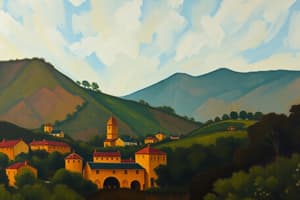Podcast
Questions and Answers
Which ethnic group is primarily associated with the homeland of Ciskei?
Which ethnic group is primarily associated with the homeland of Ciskei?
- Tsonga
- Swazi
- Zulu
- Xhosa (correct)
What was one major contradiction of apartheid described in the text?
What was one major contradiction of apartheid described in the text?
- Black labor was necessary for industrial functioning. (correct)
- Black families were prosperous in urban areas.
- White labor was crucial for the economy.
- The black population was allowed to own land.
What consequence did the influx of Black labor from the homelands have on apartheid?
What consequence did the influx of Black labor from the homelands have on apartheid?
- It made industrialization unnecessary.
- It made total segregation impractical. (correct)
- It fulfilled the goals of apartheid.
- It strengthened the pass laws.
Who replaced BJ Vorster as Prime Minister of South Africa?
Who replaced BJ Vorster as Prime Minister of South Africa?
What actions did the South African government take following the revelations of the Information Scandal?
What actions did the South African government take following the revelations of the Information Scandal?
Which homeland is associated with the Venda ethnic group?
Which homeland is associated with the Venda ethnic group?
What role did propaganda play during apartheid according to the text?
What role did propaganda play during apartheid according to the text?
What was a primary reason for increased migration of workers from the homelands to cities?
What was a primary reason for increased migration of workers from the homelands to cities?
Which two homelands were declared independent before Botha took office?
Which two homelands were declared independent before Botha took office?
What was the main reason that Kwa-Zulu did not accept independence?
What was the main reason that Kwa-Zulu did not accept independence?
What strategy did Botha implement in response to perceived threats to South Africa?
What strategy did Botha implement in response to perceived threats to South Africa?
What was the percentage of registered Indian voters who participated in the 1984 elections?
What was the percentage of registered Indian voters who participated in the 1984 elections?
Which act was passed in 1982 that affected local governance in South Africa?
Which act was passed in 1982 that affected local governance in South Africa?
Which organization was critical of the UDF’s non-racial character?
Which organization was critical of the UDF’s non-racial character?
What was a key consequence of the court ruling against Botha’s plan involving Kwa-Zulu?
What was a key consequence of the court ruling against Botha’s plan involving Kwa-Zulu?
What year was the UDF effectively banned?
What year was the UDF effectively banned?
What was a significant outcome of the low voter turnout in 1984?
What was a significant outcome of the low voter turnout in 1984?
In which year was the desegregation of private schools enacted?
In which year was the desegregation of private schools enacted?
What was one of the financial burdens mentioned related to the homelands in 1976?
What was one of the financial burdens mentioned related to the homelands in 1976?
What movement was formed in 1989 to replace the UDF?
What movement was formed in 1989 to replace the UDF?
Which of the following was NOT a reform implemented by Botha's government?
Which of the following was NOT a reform implemented by Botha's government?
What role did youth organizations play during the 1980s in South Africa?
What role did youth organizations play during the 1980s in South Africa?
Which feature characterized the Mass Democratic Movement?
Which feature characterized the Mass Democratic Movement?
What factor contributed to the rise of youth to political leadership in the 1980s?
What factor contributed to the rise of youth to political leadership in the 1980s?
What was the main reason South Africa faced bans from the Olympics during the 1960s and 1970s?
What was the main reason South Africa faced bans from the Olympics during the 1960s and 1970s?
Which agreement was signed in 1977 to end sporting ties with South Africa?
Which agreement was signed in 1977 to end sporting ties with South Africa?
Which sanctions were recommended against South Africa by the Commonwealth Accord in 1985?
Which sanctions were recommended against South Africa by the Commonwealth Accord in 1985?
What event led to increased unrest in South Africa by 1987?
What event led to increased unrest in South Africa by 1987?
Which group was in favor of sanctions against South Africa during the period of Apartheid?
Which group was in favor of sanctions against South Africa during the period of Apartheid?
What was a significant consequence of the sanctions imposed on South Africa?
What was a significant consequence of the sanctions imposed on South Africa?
In what year did the USA pass the Comprehensive Anti-Apartheid Act?
In what year did the USA pass the Comprehensive Anti-Apartheid Act?
What was the primary impact of the sanctions on the poorest populations in South Africa?
What was the primary impact of the sanctions on the poorest populations in South Africa?
What was one of the main guiding principles of the movement mentioned in the content?
What was one of the main guiding principles of the movement mentioned in the content?
What significant action did AZASO call for in 1987 regarding tertiary institutions?
What significant action did AZASO call for in 1987 regarding tertiary institutions?
Which group played a dominant role in organizing religious opposition to apartheid?
Which group played a dominant role in organizing religious opposition to apartheid?
What campaign did the South African Council of Churches (SACC) support specifically for those refusing military service?
What campaign did the South African Council of Churches (SACC) support specifically for those refusing military service?
What method did church leaders promote to further the liberation struggle as stated in the Kairos Document?
What method did church leaders promote to further the liberation struggle as stated in the Kairos Document?
Which prominent church leader was known for publicly addressing the issues faced by South Africans?
Which prominent church leader was known for publicly addressing the issues faced by South Africans?
What was the purpose of the 'Million Signature Campaign' promoted by AZASO?
What was the purpose of the 'Million Signature Campaign' promoted by AZASO?
Despite facing repression, in how many colleges, campuses, and Technikons did AZASO have a presence by 1986?
Despite facing repression, in how many colleges, campuses, and Technikons did AZASO have a presence by 1986?
Flashcards are hidden until you start studying
Study Notes
The Contradictions of Apartheid
- Apartheid aimed to separate South African citizens by race, restricting Black people to designated areas known as homelands while the White minority controlled 87% of the land.
- Despite this segregation, the economy relied heavily on Black labor, leading to an increased influx of Black workers from the homelands into cities. This contradicted the apartheid ideology and made the system unsustainable.
- While apartheid architects envisioned declining Black populations in cities by the 1970s, the reality was a dramatic increase in urban Black residents.
- Millions of Black people fled from poverty in homelands, migrating to cities in search of employment, strainin the police's ability to enforce pass laws.
- Black workers showed their power with strikes in Durban and Uitenhage in 1973, prompting employers to lobby the government for greater rights for Black workers.
The Rise of PW Botha: Reform and Repression
- Botha, replacing BJ Vorster as Prime Minister, continued the policy of homeland independence.
- Transkei (1976) and Bophuthatswana (1977) were declared independent during Vorster's regime.
- Botha expanded this policy, granting independence to Ciskei and Venda in 1981 and 1983. These were the last homelands to accept independence.
- KwaZulu, led by Mangosuthu Buthelezi, refused to accept the sham independence.
- Botha's government attempted to transfer KaNgwane and part of KwaZulu to Swaziland, but this plan was challenged and ultimately failed.
- The high cost of supporting these homelands, which reached almost R230 million in 1976, likely contributed to the end of their planned expansion.
Total Onslaught and the Rise of Resistance
- Botha characterized the growing resistance within South Africa, guerrilla attacks from neighboring countries, and international pressure as a 'Total Onslaught' orchestrated by communists.
- He responded with a policy termed 'Total Strategy,' emphasizing repression coupled with some reform measures.
Reform Measures
- The government legalized and recognized Black trade unions in 1979.
- Increased spending on Black education was introduced in 1981.
- The Black Local Authorities Act was passed in 1982.
- The Republic of South Africa Constitution Act of 1983 introduced a Tricameral Parliament, designed to include Indian and Coloured representation, but excluded Black people.
- Job reservation was abolished in 1984.
- Private schools were desegregated in 1985.
The UDF: A Key Force in Resistance
- The United Democratic Front (UDF) emerged as a powerful anti-apartheid organization.
- Low voter turnout in the 1984 elections for the Tricameral Parliament highlighted the UDF's success in mobilizing resistance.
- Rent boycotts, school protests, and stayaways became common tactics of resistance in the mid-1980s.
- The UDF faced opposition from the National Forum, a Black Consciousness organization with a socialist and Africanist approach.
- The UDF ultimately garnered greater support and became a coalition of over 500 anti-apartheid organizations.
- When the government banned the UDF, the Mass Democratic Movement (MDM) was formed as a loose alliance of resistance groups.
The Role of Youth and Student Movements
- The increasing access to education created a new generation of politically active youth, many of whom assumed leadership roles within organizations like the ANC and other resistance groups.
- Student and youth organizations grew rapidly nationwide and were often at the forefront of militant struggles, especially against the security forces, playing a pivotal role in the mass uprisings of the 1980s.
Churches and Religious Leadership
- Following the banning of many opposition organizations and the declaration of a state of emergency, churches provided a crucial platform for resistance.
- The South African Council of Churches (SACC) played a leading role in organizing religious opposition to apartheid and repression.
- The SACC supported anti-apartheid activities, including conscientious objectors, the End Conscription Campaign (ECC), and urging foreign companies to oppose job reservation.
- In 1985, religious leaders released the Kairos Document, calling for active resistance to apartheid through disobedience campaigns, boycotts, and strikes.
The Impact of Sports Boycotts and Sanctions
- South Africa faced international sports boycotts, beginning with its exclusion from the 1964 Tokyo Olympics and a full ban from the Olympics in 1970.
- The Anti-Apartheid movement forced the cancellation of the 1970 Springbok rugby tour.
- In 1977, the Commonwealth countries adopted the Gleneagles Agreement, calling for an end to sporting ties with South Africa.
- The UN passed resolutions against sports ties and segregated sport, further isolating South Africa.
- Irish trade unions refused to work with South African rugby teams, leading to numerous cancellations of games.
- The 1985 Commonwealth Accord recommended sanctions against South Africa, followed by further sanctions in 1986, including financial restrictions from the EEC and the Comprehensive Anti-Apartheid Act passed by the USA.
- These sanctions included bans on investments and loans, restrictions on imports, and the banning of SAA flights to the US and Australia.
- Sanctions had mixed effects, with some arguing they pushed the government towards reform while others believed they exacerbated the already volatile situation in South Africa.
- Unemployment in townships doubled by 1987, reaching 25% among Black workers, leading to further unrest.
- The issue of sanctions divided South Africans, with support from groups like the ANC, Cosatu, and the Anglican Church, but opposition from businesses, most White South Africans, and Inkatha.
- While sanctions undoubtedly impacted the economy, they were seen by many as a necessary step toward achieving freedom and ending apartheid.
Studying That Suits You
Use AI to generate personalized quizzes and flashcards to suit your learning preferences.




